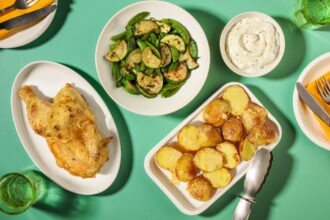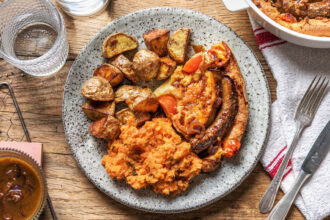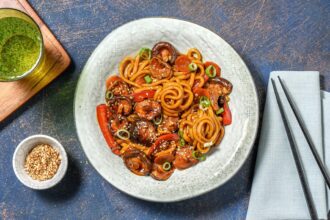Discover how to dispose of cooking oil responsibly
October 21, 2024Lots of recipes call for cooking oil, and this often means that after preparation, your pans will be left with oily residue after cooking. Especially when deep-frying food, you’re often left with cooking oil that needs to be disposed of responsibly. This is often the case for foods like battered fish, breaded chicken wings or falafel. Find out how to dispose of leftover cooking oil correctly and why it’s important.
Why dispose of cooking oil properly?
There are several reasons why cooking oil needs to be dealt with responsibly:
- If oil gets into wastewater pipes, it can congeal, partially blocking them or sealing them completely.
- Oil can flow into waterways if it isn’t disposed of properly, making it a pollutant to local wildlife.
- Cooking oil can be flammable, which means it is a potential fire hazard if not disposed of in the correct manner.
How to dispose of cooking oil in the UK
In the UK, households should never pour used cooking oil down the drain under any circumstances. Instead, it should go into household waste —unless there is a specific recycling project locally, such as sending it to a biofuel production plant. For most people, this means collecting it and putting it into a sealable container and then putting it into their black bin for collection by the local council.
Great ways to reuse cooking oil
If you want to reuse cooking oil rather than dispose of it, then here are some great ideas to try out:
- Filter cooking oil so that you can remove contaminants and cook with it again. Bear in mind cooking oil should be cooled to room temperature before you begin to strain it. A good idea is to pour the filtered oil back into the bottle it was supplied in. That way, you can reuse the container as well as the oil.
- If you have an oil lamp, then you can run it off used cooking oil after it’s been filtered. Note that olive oil is particularly well-suited to this purpose and that other oils, such as sunflower oil, will produce a little smoke when burnt, so they’re best reserved for outdoor use only.
- Learn how to make your own hand soap and make use of old cooking oil in its production. This is a fun activity that may take you a couple of attempts to perfect, but you can get great results if you are methodical. A good tip is to invest in a digital thermometer to help you get the right temperature for each stage.
- When combined with vinegar, old cooking oil can become a handy wood polish, ideal if you have a natural wood floor, for example. When trying out your homemade wood polish for the first time, work it into an unexposed area first to test it out.
- Biofuel centres can make use of old cooking oil, which is worth noting if you live close to one or there is a collection scheme in your area. Contact them to see whether they run a collection scheme for household cooking oil.
- Fashion your own candles from used cooking oil, a process remarkably similar to making homemade soap. Filtering the oil so that it’s free of contaminants is helpful when making candles that burn well and produce little or no odour.
How to filter cooking oil for reuse
Here’s how to filter your cooking oil so that you can reuse it:
- Allow it to cool to room temperature since hot oil is dangerous.
- Put a fine-mesh sieve over a bowl and pour the oil into it slowly, allowing it sufficient time to strain.
- Pour the collected, filtered oil into a bottle that you can seal, ideally with a funnel to help prevent spillages.
- Dispose of any solid contaminants you have collected in your waste bin.
Different types of cooking oil
Beyond solid fats, such as lard, butter and ghee, there are numerous different liquid oils used for cooking. Here are some of the most popular ones in the UK:
- Olive oil
- Sunflower oil
- Rapeseed oil
- Groundnut oil
- Vegetable oil
- Sesame seed oil
- Walnut oil
- Soya oil
FAQs
What to do with oil after deep frying?
If oil has only been used once or twice for deep-frying, then it can be used again. Filter and store the strained oil for another deep-frying session, only disposing of it after it is no longer good for deep-frying.
Can vegetable oil go down the drain?
No, don’t pour cooking oil down the drain, into your sink or down the toilet. Even though it is liquid, it can easily solidify and block drains, causing the need for expensive inspections and repairs.
How do you dispose of cooking fat oil?
Used cooking oil should be scraped (if it has congealed) or poured (if it has not) into a sealable container. Old takeaway containers are often ideal for this purpose, but you can use strong freezer bags, too. Seal the oil and put it into your household refuse bin, ensuring it won’t spill free before it is collected.
Is it okay to pour cooking oil outside?
No, don’t pour used cooking oil outside or into your compost. This will mean it eventually works its way into drains and culverts, potentially clogging them while also attracting unwanted vermin.
Can I pour olive oil into the garden?
Only very small amounts of uncooked olive oil can be disposed of in the garden or compost. Cooked olive oil shouldn’t be disposed of this way, so it is best to keep your uncooked oil for later use. Then, simply dispose of cooked oil in a more responsible manner.
All food products vary. The instructions printed on the food packaging always supersedes those printed in this article and must always be followed.






